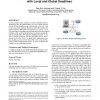Free Online Productivity Tools
i2Speak
i2Symbol
i2OCR
iTex2Img
iWeb2Print
iWeb2Shot
i2Type
iPdf2Split
iPdf2Merge
i2Bopomofo
i2Arabic
i2Style
i2Image
i2PDF
iLatex2Rtf
Sci2ools
108
click to vote
CODES
2003
IEEE
2003
IEEE
Synthesis of real-time embedded software with local and global deadlines
Current methods cannot synthesize real-time embedded software applications when the global deadline of a task is shorter than the total of all local deadlines along a critical path in the task. This creates unnecessary modeling limitations which directly affect the types of systems synthesizable. We propose a quasi-dynamic scheduling algorithm for simultaneously guaranteeing both local and global deadlines, while satisfying all precedence constraints among subtasks and among tasks. Through this scheduling procedure, we are able to formally synthesize real-time embedded software from a network of Real-Time Petri Nets specification. Application examples, including a driver for the Master/Slave role switch in Bluetooth wireless communication devices, are given to illustrate the feasibility of the scheduling algorithm. Categories and Subject Descriptors C.3 [Special Purpose and Application-Based Systems]: Realtime and embedded systems; D.2.2 [Software Engineering]: Design tools and techn...
CODES 2003 | Hardware-Software Codesign | Real-time Embedded Software | Real-Time Petri Nets | Scheduling Algorithm |
Related Content
| Added | 04 Jul 2010 |
| Updated | 04 Jul 2010 |
| Type | Conference |
| Year | 2003 |
| Where | CODES |
| Authors | Pao-Ann Hsiung, Cheng-Yi Lin |
Comments (0)

